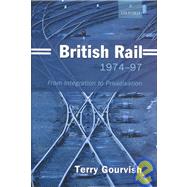- ISBN: 9780199250059 | 0199250057
- Cover: Hardcover
- Copyright: 5/23/2002
Britain's privatised railways continure to provoke debate about the organisation, financing, and development of the railway system. This important book, written by Britain's leading railway historian, provides an authoritative account of the progress made by British Rail prior toprivatisation, and a unique insight into its difficult role in the government's privatisation planning from 1989. Based on free access to the British Railway Board's rich archives, the book provides a comprehensive analysis of the main themes: a process of continuous organisational change; theexistence of a persistent government audit; perennial investment restraints; the directive to reduce operating costs and improve productivity; a concern with financial performance, technological change, service quality, and the management of industrial relations; and the Board's ambiguous positionas the Conservative government pressed home its privatisation programme. The introduction of sector management from 1982 and the 'Organising for Quality' initiative of the early 1990s, the Serpell Report on railway finances of 1983, the sale of the subsidiary businesses, the large-scale investment in the Channel Tunnel, and the obsession with safety which followed theClapham accident of 1988, are all examined in depth. In the conclusion, the author reviews the successes and failures of the public sector, rehearses the arguments for and against integration in the railway industry, and contrasts what many have termed 'the golden age' of the mid-late 1980s, whenthe British Rail-government relationship was arguably at its most effective, with what has happened since 1994.







